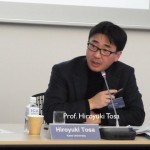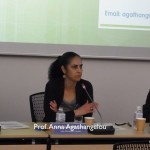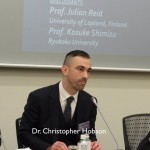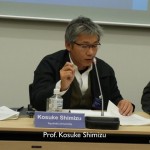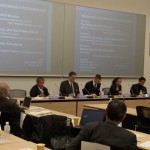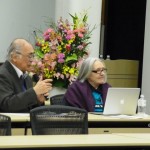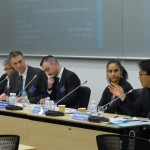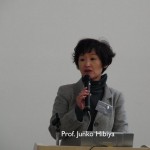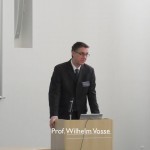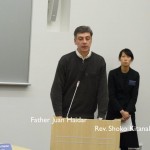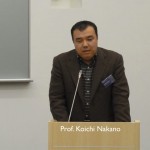32th International Symposium
人間の安全保障の危機?
金融危機および福島原発事故後に地球規模で脅かされる安全

- 開催日時
2013年1月26日(土)10:30 – 18:00
- 開催場所
国際基督教大学 東ヶ崎潔記念ダイアログハウス国際会議室
- 主催
社会科学研究所(SSRI – ICU)
- 共催
グローバル・コンサーン研究所 (IGC – 上智大学)
プログラムのダウンロードはこちら
Explanation of the theme of the symposium
ジョルジオ・シャーニー(ICU)
Keynote speech 1
- ウエストファリア資本主義の最終段階にみられる人間の安全保障の危機:リーマンショック、9・11、3・11後の人間の安全保障
武者小路公秀(大阪経済法科大学)
- The New Cold War Between States and TNCs and the world vulnerable multitudes: Human Security Polarization between Total-War States and TNCs on the one hand, and Vulnerable citizens and Multitudes on the other, created by Fear (9.11), wants (Lehman Shock), and environment catastrophes (3.11) where moribund Financial Capitalism relies to survive on the financial support of Total-War coalitions of Westphalian States in and out of the United Nations transferring debt bonds on vulnerable citizens and multitudes.
- The New Middle-Age and Human Security:
The Three-Levels Global System with a Westphalian Sphere in terminal phase with Emerging Powers, a Global Sphere of Mega TNCs and Emerging States enjoying unsustainable boom, and a Chaotic Sphere with islands of despair supported by Transnational Terrorism, and islands of hope supported by NGOs, ILCs and Anti-Hegemonic coalitions. Human Security plays two major roles in protecting vulnerable sectors in this new Dark Age, and in empowering new agents towards the emergence of a counter-hegemonic socio-cultural Renaissance. - Human Security protecting the victims of Human Security:
The Technocratic “Human Security” Efforts, generates Human Insecurity and fear through humanitarian interventions and Security Sector Reforms. It also reproduces wants and Eco-Social Insecurity by encouraging Global Exogenous development aids polarizing ecosystems and societies. These negative applications of protective “Human Security” create needs for empowering applications of Human Security towards vulnerable individuals and communities. - The Free Floating Planning mission of human security in face of the Chronic Human Insecurity in the Vulnerable Sectors of the Global System:
Protective “human security” is associated with Technocratic Meritocracy reproducing of Mediocracy misuse of Human Security, Human Security becomes a legitimizing argument for order maintenance denying Creative Alternatives by their association between Human Security and Imperial Common-Sense Reproduction. It also helps the fixation of models of modern humanism, based on the ideal types of Homo Economicus and Homo Politicus obstructing roads towards Multi-cultural Conviviality which require overcoming greed and arrogance associated with the two ideal types. Human Security has to support non-State security empowerment of the islands of insecurity in the Dark Age ocean of insecurity. Human Security should protect their efforts based on pluralistic identity recognition leading to multi-cultural “common-security” of all vulnerable peoples. - The Organic Intellectual mission of Human Security in Building a New Multi-Cultural Renaissance:
Islands of despair and of hope in the Ocean of Post-Modern Dark Age may someday generate new potentialities for counter-hegemonic change towards a new Pluralistic Renaissance. This will become possible only when Human Security can link their despair and hope through Common Security among citizens and multitude joining a Human Security Coalition with alternative economic development movements, global human rights and justice movements, and Mother Earth movements of indigenous communities and industrial society citizens. Human Security and Human Rights provide the possibility of combining universal values coming from the West Enlightenment with individual collective values of non-Western indigenous and Axial Religious civilizations. - Human Security Studies aiming should aim at the formation of a new Epistemic Community Surviving the Dark Age and Preparing a New Multi-civilizational Renaissance:
The New Dark Age needs that the Universal Values of the Western Civilization be transmitted and creatively combined with non-Western communitarian values through an inter-Civilizational dialogue. Human Security should become one of the Arena for such inter-Civilizational and inter-paradigmatic dialogue, as the Christian Monastic Orders did in Western Dark Age. This requires that Human Security becomes an epistemological intellectual field where free-floating and organic intellectuals can exchange ideas preparing for a multi-cultural renaissance, combining sub-national identity communities of bio-cultural local regions. The Universalism of Western Enlightenment should be linked with these local identity epistemic micro-communities through traditional epistemic communities recognizing the importance of a Common Security structure of multi-culturalism through a common acceptance of Human Security. Human Security should be closely associated with the Security of Mother earth, with the unity and diversity of Life should become the basis of Common Human Security. The Renaissance of the Western Civilization was built by the alliance of Universalist intellectuals sharing a Greco-Roman value system and the emerging national identity communities of the emerging national intellectuals. A new Renaissance in the post-Lehman, 9.11 and 3.11 world will have to combine the Universal Values of Human Rights with emerging, or rather re-emerging traditional community values of indigenous peoples and pre-modern axial civilizations representing different perceptions of the core values shared by all humans, individuals and communities at the root of the Human Security.
討論者:千葉眞(ICU)
司会者:中野晃一(IGC所長)
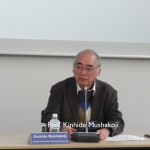
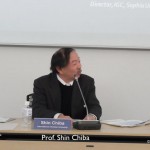
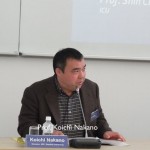
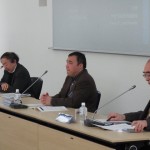
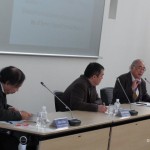
Keynote speech 2
- 追放:複雑性が原始的な暴力性を生み出すとき
サスキア・サッセン(コロンビア大学)
討論者:大石奈々(上智大学)
司会者:ヴィルヘルム・フォッセ(SSRI所長)
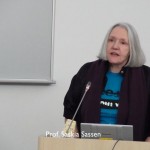
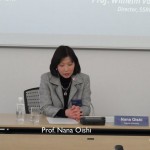
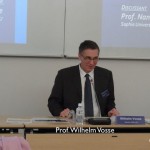
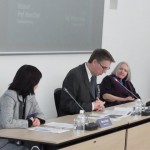
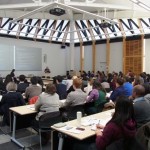
Keynote speech 3
- 人間の安全と棄民
ムスタファ・カマル・パシャ(アバディーン大学)
討論者:ジョルジオ・シャーニー(ICU)
司会者:毛利勝彦(ICU)
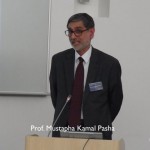
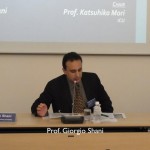
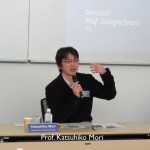
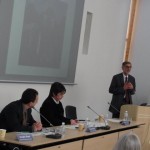
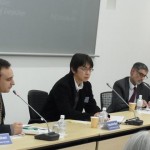
Human safety threatened in Japan after the Fukushima nuclear accident
- ハイブリッド・モンスターの政治:不運と不正義の境界線に関する省察
土佐弘之(神戸大学)
- 事故、契約、放射能汚染された身体: 福島原発事故の時代における地球規模での核の秩序
アナ・アガサンゲロウ(ヨーク大学、カナダ)
- 福島原発事故後の人間の安全:さらなる変化へ
クリストファー・ホブソン(国連大学)
討論者:ジュリアン・リード(ラップランド大学)
討論者:清水耕介(龍谷大学)
司会:ヴィルヘルム・フォッセ(SSRI所長)
